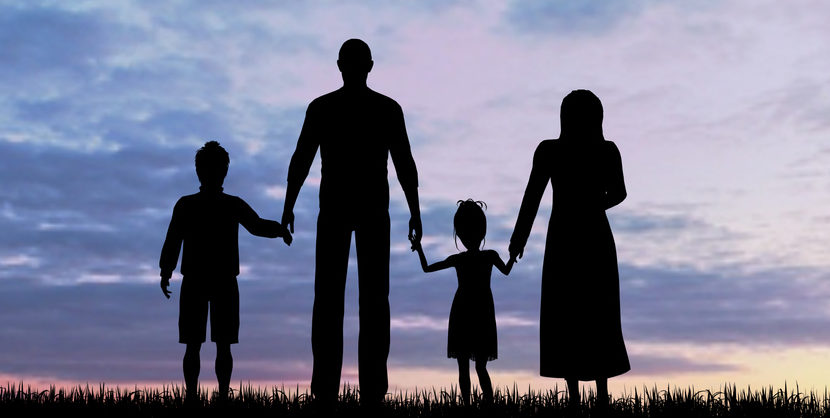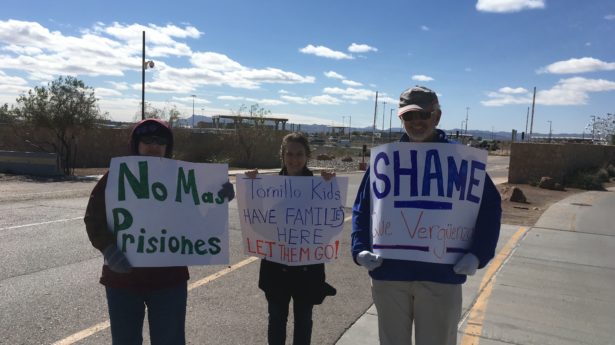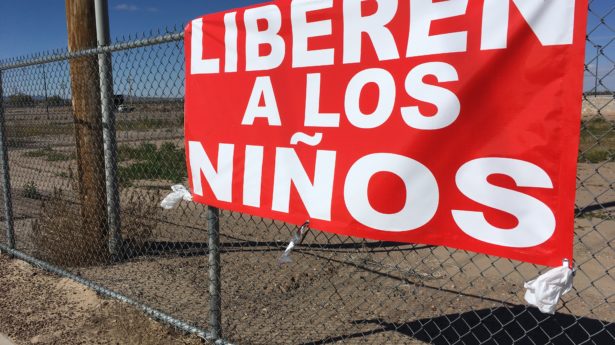The Unitarian Universalist Service Committee advances human rights through grassroots collaborations.

By on December 14, 2018
Part 4: Hope on the Border
As I walked through the narrow hallway of the Hope Border Institute to my meeting, two women with their hair wrapped in towels hurried past. I asked my hosts, “Is your office one of the emergency shelter sites too?” It turned out that a building next door owned by the diocese was being used as a shelter, but didn’t have showers. A steady stream of arriving asylum-seekers had been coming through their office to use the one there since the emergency housing need began the month before.
Coffee and cookies were waiting for us when I sat down with Hope Border Institute’s Ilka Vega and Edith Tapia, also joined by UU ministerial intern Zeb Green, who came to El Paso from Washington D.C. to participate in an interfaith day of action against the Tornillo tent city detention camp for children.
We came to hear from local organizers about how we could support their work, help their message reach more of the country, and collaborate. They were grateful for and relieved by such an open-ended ask from a national organization: “It’s funny – everyone is talking about us as a humanitarian crisis, yet here we are, never invited to the policy table, not supported to strengthen our own local networks or to utilize our own local resources.” The influx of out-of-town volunteers can be helpful with the right coordination, but it is something they’ve struggled to absorb. “People come and go after a day or a month, but those of us on the ground will continue to be here.”
Ilka and Edith explained how issues like the Tornillo child tent camp are more complex when you have to look at the long-term and the big picture. It’s easy and feels right to say “Shut it down.” But what happens next? What were the conditions that led to an immigrant child tent camp here in the United States and have we addressed those conditions? If all of the attention is on a single facility and it closes, kids could be moved to even more remote and isolated areas. More tent camps for adults could be built, based on the idea that it’s only wrong for children. So yes, we need to shut down Tornillo—but in the same breath as that demand, we also need to ask that kids who have family in the United States are released to them without risk of immigration enforcement getting involved.
Edith reminded us: “Here in El Paso we are, in fact, a migrant community. This area has been a historic transit point, a place of encounter, even pre-colonialism. We are used to it. So people in this community have been ready to support all of the new arrivals—bringing food, blankets, anything they have to share. This is who we are as a community.”
After the meeting and before I started my shift at the San Juan Diego Center for the day, I stopped in at a nearby hole-in-the-wall diner to grab something to eat. I took a seat at the counter and a woman slid onto the stool next to me. I couldn’t tell at first if she worked there or if she was another customer. “You have to try the machaca. Don’t eat meat? You can’t go wrong with the chilaquiles. You like spicy?” I nodded and she turned to the cook, “Get this girl some chile con queso to go with her meal.”
She asked, “What brings you to El Paso?” and I told her about the emergency shelter down the street. She immediately responded, “I can make them dinners. This place closes at 3:00 p.m. and we can cook here and bring it down. If they get donations like big bags of beans and rice and need someone to cook them, I can prepare them right here and bring it over.” I took down her number and promised to share it with the shelter’s coordinator.
Her sentiment embodied the message Ilka had urged me to bring home: “The border is not a place of crisis. We are honored to be in a place and position to serve, receive, and offer solidarity with those seeking asylum. This is ultimately a story of love, which is embedded in our community. We are a place of seeing across borders, families across borders, and we do not feel like the people arriving are an ‘other.’ They are us. It is an honor to serve and to love.”
Photo Credit: iStock – Bestgreenscreen

